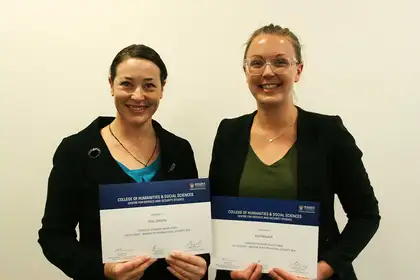
Toni Jordan and Ashleigh Walker, who were awarded for the top theses in the Master of International Security.
Two women police employees have been awarded top honours for their Master of International Security research projects on safety and security issues that affect women’s lives here and overseas.
Toni Jordan and Ashleigh Walker were awarded the prize jointly by the Centre for Defence and Security Studies for their research theses undertaken in the Master’s programme.
Ms Walker, now an intelligence analyst at the National Intelligence Centre, completed her research by way of internship within the Police National Prevention Centre. Her research explored opportunities for New Zealand Police to reduce family harm through routine service of protection orders, something that has traditionally been done by court bailiffs.
The research used a mixed-methods approach to investigate trends in protection order contravention and the impact that routine service policies in Counties Manukau and Central police districts were having. Interviews were conducted with family violence teams to find out about staff views on the effectiveness of routine service policies, and the additional resources demanded by these policies.
The outcome of her research was to highlight; “the opportunity for police to positively impact protection order contravention rates, when we act with urgency and engage proactively with outside agencies to share information and ensure parties involved understand the implications of the order”.
Evidence and interviews suggested that offenders served protection orders by police officers tended to take them more seriously and better understand the implications of the order.
Family harm intervention is becoming increasingly collaborative, reflected in pilot initiatives focusing on increased information sharing and combined response by various government agencies, Ms Walker says.
She is currently on secondment to the Police National Command and Coordination Centre, and says her research has enriched her understanding and knowledge of fast-changing security issues in the policing context.
More women needed for peacekeeping
Ms Jordan, a police detective in Auckland Central, explored the reasons senior rank New Zealand Police women are not applying for overseas peacekeeping deployments. The issue is viewed in the context of the New Zealand Police’s obligations to meet the United Nation’s Women, Peace and Security agenda as part of the Government’s National Action Plan introduced in 2015. By 2016, 67 countries had such plans.
Her study found that while there are sufficient women at Constable rank being deployed, “New Zealand Police are not in compliance with United Nations guidelines in relation to female police officers participating in overseas deployments, who might otherwise be in leadership.”
Gender equality has important consequences for international security, she says. Research has shown “participation of women in peace processes increases lasting peace by 20 per cent for at least two years, with peace increasing over 15 years by 35 per cent”.
She interviewed 64 senior ranked New Zealand women officers via an anonymous online survey, which included questions on whether having partners, children or other family commitments was a barrier to applying for overseas deployments. Her findings challenged prevailing perceptions, with most stating their family arrangements were not a deterrent. She also asked participants about whether concerns about personal safety, confidence, leaving pets, access to pastimes, health and re-adjustment to New Zealand life posed a problem.
Ms Jordan says encouraging more women to apply for overseas peacekeeping roles is important, particularly in places with high levels of sexual violence against women, and where rape has been used as a tactic of war. In post-conflict settings, almost 40 per cent of male offenders are known to their victims, and in many cultures women are not permitted to discuss sexual issues with men. “Without a great deal of trust, victims may not make complaints,” she says.
Her research highlights the complexities for the New Zealand Police, with a small number of senior ranked women making up only 1.08 per cent of the sworn workforce. This is compounded by the few long-term overseas deployments available to senior staff, which effectively comprises three postings every two years.
Ms Jordan, who trained in the Metropolitan Police in the UK where she worked for eight years before returning to New Zealand, says completing her degree while working fulltime was a huge personal achievement. She says she struggled with confidence at the start, but thrived with the supportive, flexible study environment at Massey, discovering a love for study and research, and a desire to continue.